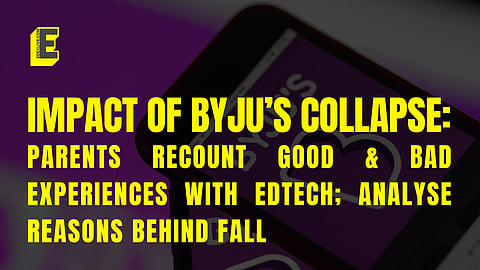

BYJU’S, India’s prominent EdTech company, founded by Byju Raveendran in 2011, is grappling with a series of challenges.
Once valued at a staggering $22 billion (USD 2200 crore/ Rs 18,000+ crore), the company is now facing financial woes, mismanagement allegations, layoffs, and reports of a toxic work culture.
At Edexlive, we reached out to parents and students among many other individuals who are familiar with BYJU’S services to understand the company’s challenges and its potential impact on the EdTech landscape at large.
Priyanka Singh, a parent, and an educator, attributed BYJU’S current status to Raveendran’s constant profit-oriented approach. “I think, a few financial advisors from his team contributed to this decline and now, he is paying the price of possessing a money-making mindset,” said Singh.
Sona Yadav, who recently sought BYJU’S services for her Common Admission Test (CAT) preparation, expressed her dissatisfaction with the services. “The registration process was smooth, however, once the classes began, it wasn’t on par with my expectations, and that’s because they kept cancelling lectures without prior notice,” said Yadav.
She criticised the EdTech firm for charging “extraordinary” fees without delivering the commensurate study material.
“BYJU'S always boasts about its extraordinary services and study material. However, in my opinion, it was easily available elsewhere as well. I did not find anything unique about it,” she said.
When Yadav was asked if this experience changed her perception towards EdTech firms, she remarked how other firms in the same league are doing a better job as compared to BYJU’S.
“Apart from BYJU’S, I have had the chance to experience services of other EdTech firms as well and honestly, the others are better,” said Yadav.
Vishesh Singh from Dehradun, Uttarakhand recounted a disappointing experience with BYJU’S customer services. “I signed up for BYJU’S during my school days. One day, out of the blue, they contacted me, asking for payment of Rs 10,000, promising access to all their videos and a brand-new tablet. After making the payment, I encountered an issue while logging in, resulting in a typo with my password. Despite reaching out to BYJU’S for assistance, I received no help,” adding that the company consistently avoided his queries.
“Soon I and my family realised that the investment went to waste and the tablet turned into a low-quality gaming device. Following this disappointing experience, I was not inclined to invest in any EdTech platforms, particularly BYJU’S,” said Vishesh.
BYJU’S highs to lows during pandemic:
As the world grappled with challenges imposed by the COVID-19 pandemic, EdTech giant BYJU’S saw a significant rise in its popularity, largely attributed to what many have described as “outstanding marketing strategies”.
Sona Yadav acknowledged the firm’s adeptness in seizing the opportunity presented by the pandemic-induced shift towards remote learning.
“The transition to remote learning was new for all and BYJU’S capitalised on it with its savvy marketing strategies, garnering a significant boost in its popularity. However, it’s now evident that their exorbitant fees didn’t quite match up to the quality of services offered,” said Yadav, adding that it’s important for them to address these shortcomings as they navigate through this period of decline.
Contrasting experiences emerged from parents who subscribed to BYJU’S services.
Priyanka Singh, a parent from Bengaluru, expressed her initial satisfaction with the services, highlighting the impact it had on her son who is pursuing secondary school education.
“While initially I had reservations about virtual learning, my son’s experience with BYJU’S completely changed my perspective. I was pleasantly surprised by the quality of their services and teaching methodology. The positive outcome convinced me of the effectiveness of their approach,” said Priyanka, adding that the news about its decline did not impact them.
Similarly, Sasmita Rath, another parent, lauded BYJU’S teaching methodology and staff, affirming that despite concerns about funding-related news, the quality of coaching remained unaffected.
“Their teaching methodology focuses on grasping concepts and frequent evaluations have made the learning process more interactive and impactful,” said Rath.
Parents expressed their dissatisfaction with BYJU’S persistent follow-up calls post-pandemic, forcing Priyanka Singh to terminate the subscription due to the annoyance caused by the incessant calls.
“Initially, during the COVID-19 pandemic, BYJU’S proved to be a blessing in disguise, facilitating peaceful learning from home. However, post-pandemic, I found myself bombarded with countless sales calls, pressuring me to purchase additional services. This intrusive approach quickly became a source of irritation, undermining the peaceful learning environment we had previously enjoyed.”
BYJU’S trajectory:
Initially propelled to success by its online and offline educational services, BYJU’S has recently encountered a sharp decline in investor support, including from major backers like Blackrock and Prosus. Cash flow issues and other internal challenges have contributed to the company’s downfall.
Latest reports reveal that BYJU’S had mandated a work-from-home policy for a significant portion of its workforce and allegedly terminated employees without notice, further exacerbating concerns about its management practices. Delayed salaries have also been a subject of contention.
In a separate development, investors have filed a plea stating that BYJU’S has circumvented the National Company Law Tribunal (NCLT) by allotting shares without increasing the company’s authorised share capital. However, BYJU’S has denied these allegations.
Despite these setbacks, BYJU’S claims to have over 150 million registered students, reflecting a continued trust in the Bengaluru-based EdTech giant.
However, the company's public struggles have raised questions about the broader sentiment towards EdTech platforms in India.
